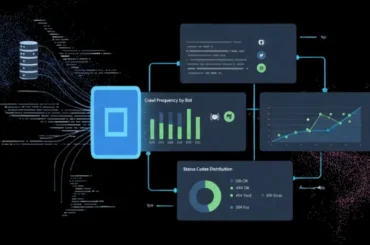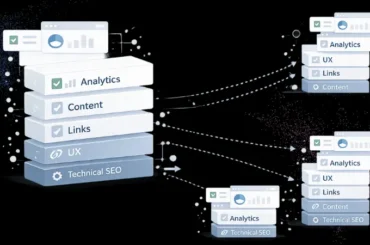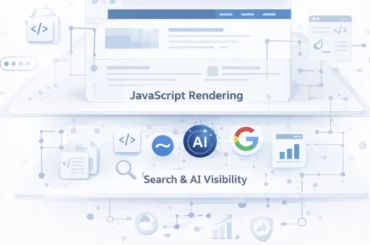The moment we think of digital marketing, the first term that comes to our mind is Search Engine Optimization (SEO). But if you’ve been hearing phrases like “Is SEO dead” or “SEO doesn’t matter anymore”, let’s set the record straight; SEO isn’t dead, but it has definitely changed. In fact, studies show that the first five organic results capture nearly 69% of all clicks, while 99% of users never scroll past the first page. That is a testament to the fact that SEO remains crucial for visibility, but it is no doubt that the approach has evolved.
Google’s algorithms have matured, user behavior has shifted, and AI is reshaping how people search. What worked in 2015 or in 2020 may not satisfy you with the same results in 2025. Today, SEO requires more strategy, authenticity, and adaptability than ever before. So, if you’re still treating SEO as just keyword stuffing and backlinks, you’re missing the bigger picture.
Join us in this blog to see how SEO has evolved, what matters today, and how businesses can win in this new era.
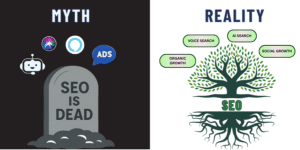
Why People Keep Saying “SEO is Dead”
When Google announces a new algorithm update or a new technology like ChatGPT, voice assistants, or AI-powered search, you often hear people say “SEO is dead.” Let’s speak about why some people think SEO is “dying”:
AI-Driven Search: Google’s AI Overviews and technologies like ChatGPT have made it easier for people to discover answers without having to go to websites.
- Paid Ads Dominance: Search Engine Result Pages (SERPs) are now flooded with ads, which have significantly reduced the visibility of organic results.
- Voice Search: People talk to Alexa or Siri and ask them questions directly, thus they may never see regular search results.
- Social Media Discovery: Instagram, TikTok, and LinkedIn have all become search engines in their own right.
The Bottom Line: SEO isn’t going away; it’s getting bigger. It’s not enough to merely rank well on Google; you also need to be visible on many other sites.
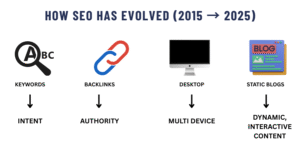
How SEO Has Evolved
So, if SEO is not dead, what has changed, and why is it not the same as it used to be? Let’s figure all this out right away and see how SEO has evolved over the recent years:
1. From Keywords to Intent
- Then: Stuffing “best footwear online” worked everywhere.
- Now: Google cares about context. A post answering “Which shoes are best for flat feet?” beats keyword repetition any day.
2. From Backlinks to Authority
- Then: Quantity mattered. The more backlinks you had, the better.
- Now: Google values quality. A link from a reputed site like Forbes or HubSpot is worth more than 100 random directory links.
3. From Desktop to Multi-Device Experience
- Then, make it work better on desktop and add mobile responsiveness.
- Now, speed, mobile-first indexing, Core Web Vitals, and experiences that work on all devices are required.
4. From Static Content to New and Interactive Content
- Blogs used to stay at the top of search results for years with few revisions.
- Today, old information loses its place in search results. To stay relevant, you need to get regular updates, engaging images, videos, and statistics.
5. From Static to Dynamic, Interactive Content
- Then: A blog post could rank for years with little to no update.
- Now: Fresh updates, engaging visuals, videos, and new data are critical to stay on top.
What Really Matters for SEO in 2025
You now know that SEO is not dead; it has evolved, so what is it that really matters for SEO in 2025? Let us throw some light on this:
- E-E-A-T (Experience, Expertise, Authoritativeness, Trustworthiness): Google ranks businesses that demonstrate credibility. Add author bios, cite reliable sources, and show real experience.
- Topic Authority, Not Just Keywords: Create clusters of content around a subject, not just single blogs. Example: A real estate brand should cover “home buying guide, property taxes, mortgage tips, legal paperwork”; not just one article on “buying a house.”
- Search Intent Optimization: Is the user looking for information, comparison, or purchase? Tailor your content accordingly.
- AI-Friendly Content: Tools like ChatGPT and Bard are pulling content from credible sources. If your content is structured, accurate, and fresh, it’s more likely to be used.
- Zero-Click Results & Featured Snippets: Use schema markup, write short
replies, and add FAQs to get to “position zero.” - User Signals: Time on page, bounce rate, and click-through rate (CTR) now tell Google if your content deserves higher rankings.
What Businesses Should Stop Doing Immediately
To keep pace with the changing times and patterns in SEO, what are the things and practices that businesses should stop doing immediately? Have a look:
- Writing thin, keyword-stuffed blogs with no depth.
- Over-relying on AI-generated content without editing.
- Ignoring technical SEO basics (like HTTPS, speed, and structured data).
- Buying cheap, spammy backlinks.
- Treating SEO as a one-time project instead of a long-term play.
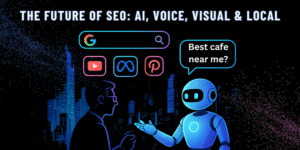
The Future of SEO: Where It’s Heading
SEO was there and still exists in an improved form, but where will it head in the future? Reading these pointers will help you figure out the future of SEO:
- Voice and Conversational Search: Optimizing for questions like “What’s the best café near me?”
- AI and Personalization: Search engines will deliver results tailored to a user’s history, preferences, and context.
- Visual & Video Search: YouTube, TikTok, and Pinterest searches are becoming as important as Google.
- Local SEO Growth: “Near me” searches are skyrocketing, making local visibility more essential than ever.
Why You Need an Adaptive SEO Partner?
The SEO landscape will keep shifting. What works today may not work six months later. To succeed, you need a partner who:
- Tracks every Google algorithm update.
- Balances creativity with data-driven execution.
- Integrates SEO with content, design, and branding.
- Understands both local and global markets.
This is where Straction Consulting, a Noida-based digital marketing agency, stands out.
Conclusion: SEO Is Alive, But Only for the Adaptive
SEO isn’t dead; it’s just smarter, tougher, and more exciting. The brands that adapt, experiment, and prioritize users will continue to win.
We don’t see SEO as a list of things to perform at Straction Consulting. We view it as a dynamic growth engine that evolves based on algorithms, user demands, and emerging technologies. We’re here to help you rank for important keywords, create authority in your field, and make sure your brand shines out in AI-driven search.
Get in touch with Straction Consulting today to learn more about our adaptable SEO services. They’ll help you future-proof your online presence. Are your competitors changing, and are you?



